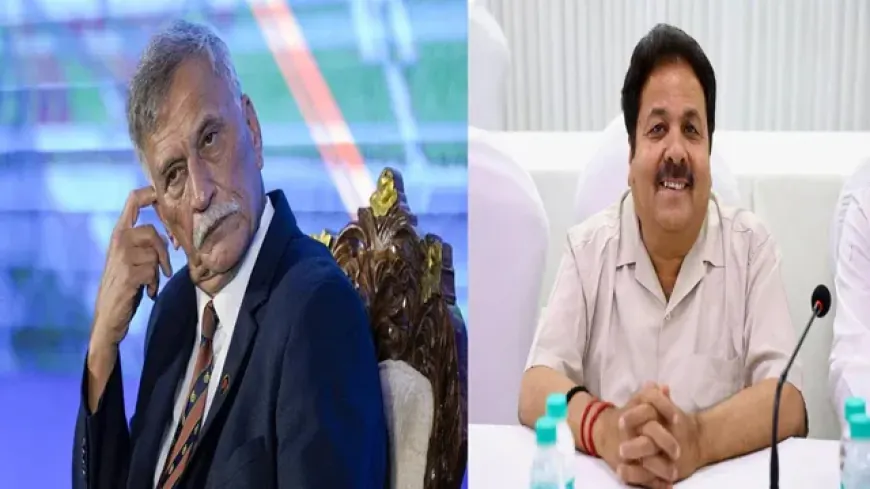Rajeev Shukla Appointed Interim BCCI President After Roger Binny Resigns
Rajeev Shukla took over as the acting BCCI chief after Roger Binny resigned. He will head the board till the BCCI elections in September while key decisions such as new sponsorship contracts and changes in governance are pending.

The Board of Control for Cricket in India has experienced another shift in its leadership at the highest level. Roger Binny, who was the president of the BCCI, is no longer at the helm and vice president Rajeev Shukla has taken over as the interim president. As per reports Shukla will continue in this role until the next BCCI elections cycle which is likely to come about in September. There is also a possibility that Binny might come back as president if he wins those elections but until then Shukla is taking on the duty of running the cricket board.
This power transition was confirmed at the recent BCCI Apex Council meeting that was conducted on Wednesday. News indicates that the central point of discussion at the meeting was the sponsorship status of Team India as Dream11 recently backed out as the prime sponsor. The timing of this change is significant since the Asia Cup will start from September 9 and BCCI has little time left to sign up with a new sponsor. Officials have made it clear that they are not looking for a temporary replacement for one tournament but more so for a long term association that would continue till the ODI World Cup in 2027.
Rajeev Shukla has no prior experience of duties from Indian cricket. Earlier in 2015 he was reappointed as the Indian Premier League chairman unanimously by the BCCI. Later in December 2020, he got elected unopposed as the vice president of the BCCI. His prolonged involvement in cricket administration and exposure to the IPL have made his name well known in cricket circles. Now with Binny relinquishing, he has again taken a leadership role at a very critical time for Indian cricket.
The leadership change talks have also come at a time when Indian cricket administration is undergoing larger changes at the national level. The new National Sports Governance Act was recently cleared in parliament but will take four to five months before the law becomes effective. During that time the BCCI will abide by the norms outlined in its existing constitution which was drawn up after the Supreme Court judgment on the basis of Lodha Committee recommendations. It means that September's elections would still happen under the current regulations.
One of the most significant components of the Lodha proposals was the age limit for office bearers that was fixed at 70 years. The new law has amended this by granting the age range of 70 to 75 years to contest elections provided their international governing body byelaws allow them to do so. While imposing this restriction, the law at the same time also curtails the tenure itself by making it compulsory for the office-bearers to resign after they serve for nine years in aggregate or six consecutive years as office-bearers. This has instituted new regulations regarding the manner of leadership in sports organizations like BCCI in the future.
For the time being Rajeev Shukla is likely to steer the BCCI during a phase that has both risks and opportunities. Getting a robust sponsorship agreement prior to the Asia Cup continues to be among the highest priorities of the board as it has a direct bearing on the financial well-being of Indian cricket. With the Asia Cup imminent and the Cricket World Cup around the corner later this year the next few months are of importance. Sponsors will be focusing on long term agreements and BCCI will want to secure a deal that brings stability for the next couple of years.
The change of leadership also implies that state associations and other cricketing administrations will have to observe carefully what happens at the top. There have been reports that if Roger Binny had to relinquish his post then state associations also will need to conform to the same governance framework and abide by the rules accordingly. This is the bigger change taking place in Indian sports administration where similar governance standards are being applied across the board.
Rajeev Shukla's own record lends him the authority to navigate the complexities of this interim position. He has long been regarded as a powerful cricket politician and one who can keep up with the stresses of administration and diplomacy at one and the same time. Having held significant roles over the years, he is well aware of the level of work involved and the expectations of heading an institution as influential as the BCCI. Though his tenure at the moment is short-term his choices over the next few weeks may determine the near future of Indian cricket.
The next elections due in September will be a critical milestone. If Roger Binny chooses to contest and returns to power again he will again be in charge of the board. Otherwise Indian cricket will witness the emergence of a new full-time president. Either way the elections will determine in which direction the world's dominant cricket organization evolves. Until then Rajeev Shukla's leadership will be monitored closely by cricket fans pundits and stakeholders who realize the importance of this shift.
For now the emphasis is unambiguous. The BCCI requires stability sponsorship security and leadership that will be able to handle the expectations of fans as well as the economics of the game. Rajeev Shukla has taken over at a juncture where these requirements are at their height. The next few weeks will determine how well he can steer Indian cricket through this period and lay the platform for the elections which will delineate the next stage of the board's journey.



 admin
admin